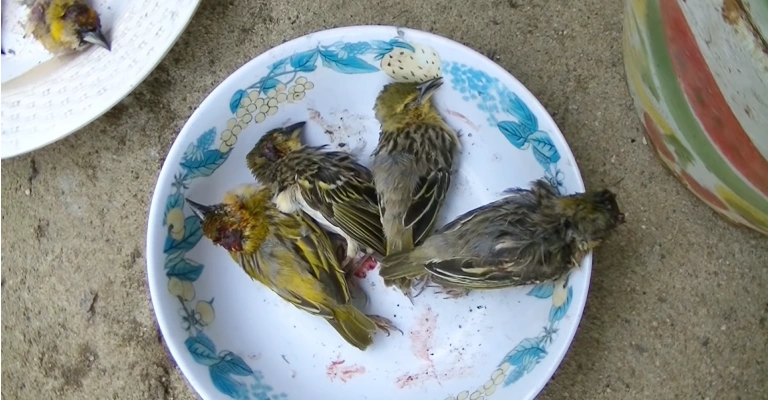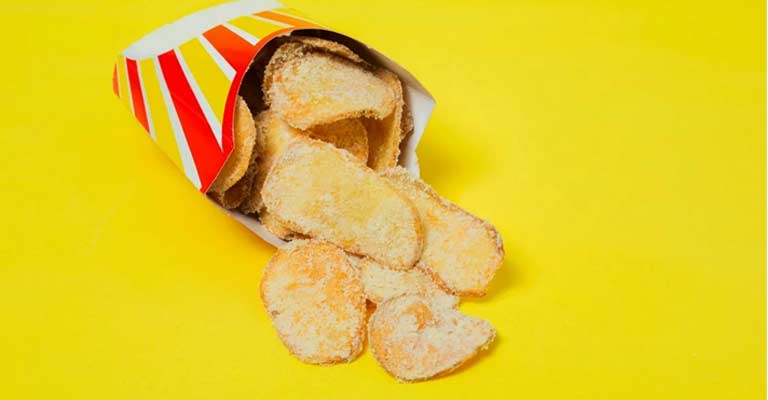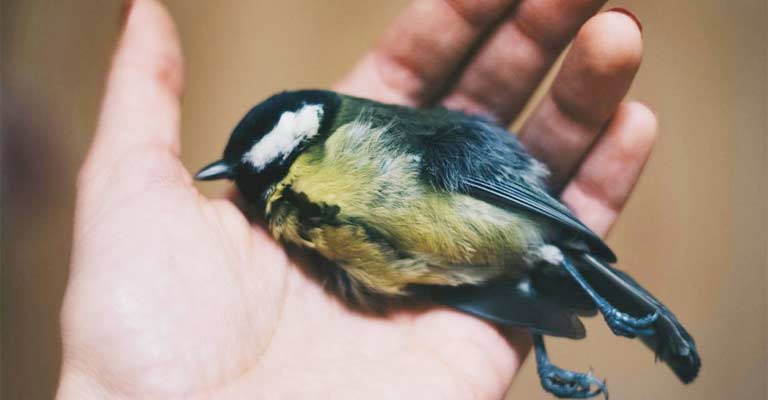Birds, with their delicate frames and vulnerable nature, are an integral part of our ecosystem, contributing to the beauty and balance of our environment.
However, many well-intentioned individuals unknowingly put these feathered friends in harm’s way by offering them inappropriate food.
While feeding birds can be a delightful pastime, it is crucial to understand that not all food is suitable for our avian companions. So, what food kills birds instantly?
While we may think we are providing sustenance to our winged neighbors, some common human foods can have devastating consequences for these creatures. It is essential to be informed and responsible in our efforts to support and protect our feathered friends.
Join us as we uncover the food items that when ingested by birds, can lead to devastating consequences, and learn how to create a bird-friendly environment that fosters their well-being.

What Food Kills Birds Instantly?
Ensuring the well-being of your pet bird involves not only providing a balanced and nutritious diet but also being aware of foods that can be harmful to them. Here is a detailed look at some foods that should be strictly avoided to safeguard your feathered companion’s health.
Avocado
Avocado, despite its nutritional value for humans, poses a severe threat to birds. It contains a substance called pepsin that can lead to organ failure in birds. For the safety of your pet, it’s crucial to completely eliminate avocado from their diet.
Chocolate
Similar to dogs, birds should never be exposed to chocolate. Theobromine, present in chocolate, can be lethal to birds. Even in small amounts, it can lead to serious health issues, making it imperative to keep all chocolate products out of reach.
Caffeine
Common sources of caffeine, such as coffee and tea, should never be given to birds. Caffeine can adversely affect heart function and lead to complications. Choosing caffeine-free alternatives ensures the well-being of your feathered friend.
Alcohol
Alcohol consumption can have detrimental effects on a bird’s liver and nervous system. To avoid severe health consequences, it’s crucial to keep all alcoholic beverages away from your pet bird and their environment.
Onions and Garlic
While these ingredients may be staples in human cuisine, they contain substances that can damage a bird’s red blood cells, leading to anemia. To prevent such health issues, it’s best to exclude onions and garlic from your pet bird’s diet.
Salty Foods

High-sodium foods like chips and pretzels can pose a risk to your bird’s kidney health. Restricting their access to salty snacks helps in maintaining optimal kidney function and overall well-being.
Fruit Pits and Apple Seeds
Cyanide, a highly toxic substance, is present in many fruit pits, including those from peaches and cherries. Apple seeds also contain cyanide. To prevent poisoning, always remove pits and seeds before offering fruits to your bird.
Moldy Foods
Mold can produce harmful toxins, posing a significant risk to your bird’s health. Regularly check and discard any spoiled or moldy foods to ensure the freshness and safety of their diet.
Dairy Products
Birds lack the necessary enzymes to digest lactose found in dairy products. Milk and cheese, therefore, are unsuitable for their consumption. Opt for alternatives that are better suited to their digestive system.
Junk Food and Sugary Treats
Sugary and fatty treats, such as candy, sugary cereals, and chips, can contribute to obesity and other health issues in birds. A diet rich in nutrition and free from these indulgences promotes a healthier and longer life for your feathered companion.
By being mindful of these potential hazards and making informed dietary choices, you can play a crucial role in ensuring the longevity and vitality of your pet bird.
Regular veterinary check-ups coupled with a well-balanced diet contribute to a happy and healthy life for your feathered friend.
In addition to knowing what to avoid, it’s essential to pay attention to your bird’s feeding habits. Some birds are more prone to obesity, while others may be picky eaters. Monitor your bird’s weight and behavior, and adjust its diet accordingly.
If you’re unsure about what foods are safe or best for your specific bird species, consult with an avian veterinarian or a qualified bird expert. They can provide tailored advice based on your bird’s unique needs.
What Smells Can Kill Birds?

There are several smells that can be harmful to birds, and while not all of them are lethal, they can have adverse effects on their health.
Birds have highly sensitive respiratory systems, and certain odors and fumes can be particularly harmful to them. Here are some smells that can potentially harm or distress birds:
Teflon (Polytetrafluoroethylene) Fumes
One of the most well-known and dangerous smells for birds comes from overheated Teflon cookware. When Teflon is heated to high temperatures, it can release toxic fumes, including polytetrafluoroethylene, which can be lethal to birds.
These fumes can lead to a condition known as “Teflon toxicity” or “polymer fume fever” in birds. Symptoms can include labored breathing, disorientation, weakness, and, in severe cases, death.
It’s essential to use non-stick cookware with caution around pet birds and ensure proper ventilation in your kitchen.
Strong Chemical Odors
Birds have delicate respiratory systems, and strong chemical odors from products like household cleaners, air fresheners, aerosol sprays, or paints can irritate their lungs and airways.
These odors can lead to respiratory distress, coughing, and difficulty breathing. To protect your birds, avoid using such products near them and ensure good ventilation if you need to use these items in your home.
Opt for bird-safe cleaning products and unscented options when possible.
Smoke and Tobacco Products
Cigarette smoke and the chemicals in tobacco products can be harmful to birds. Secondhand smoke can lead to respiratory issues and other health problems.
Smoking in the vicinity of pet birds should be strictly avoided to protect their well-being. Additionally, nicotine and tobacco are toxic if ingested by birds, so ensure that they cannot access these substances.
Perfumes and Fragrances
Strong perfumes and fragrances can overwhelm a bird’s sensitive sense of smell and may cause discomfort or distress. Birds prefer clean, fresh air, and strong scents can be unsettling to them.
It’s a good practice to use mild or unscented personal care products and avoids wearing heavy perfumes when interacting with your pet bird.
Scented Candles and Incense
Scented candles and incense can release aromatic compounds into the air. Birds have a keen sense of smell, and these strong odors can irritate their respiratory systems.
It’s advisable to use unscented or bird-safe candles and incense if you want to enjoy them in your home while keeping a pet bird.
Gas and Fumes
Exposure to toxic gasses or fumes, such as carbon monoxide or fumes from heating appliances, can harm birds. Ensure that your bird’s living space is well-ventilated and free from any potential sources of harmful gases.
Carbon monoxide detectors are a wise addition to your home for both your safety and your birds.
Paint and Solvent Odors
The strong odors from paints, varnishes, and solvents can be harmful to birds. It’s best to keep your bird away from areas where these products are being used and ensure proper ventilation in these spaces.
Birds should not be exposed to paint fumes, and the area should be thoroughly aired out before reintroducing your pet.
Insecticides and Pesticides
The odors and fumes from insecticides and pesticides can be toxic to birds. Never use such products near your bird, and be cautious when using them in the home. If necessary, choose bird-safe pest control options.
Mold and Mildew
Mold and mildew infestations can produce odors and spores that are harmful to both birds and humans. Birds can develop respiratory issues when exposed to moldy environments.
It’s essential to address any mold or mildew problems in your home promptly and ensure a clean and healthy living space for your pet bird.
FAQs
What foods are toxic to birds and could potentially harm them?
There are several foods that are toxic to birds, including chocolate, caffeine, alcohol, avocado, and certain fruits with pits or seeds. It’s crucial to research and ensure that any food provided to birds is safe for their consumption.
Can feeding birds spoiled or moldy food be harmful to them?
Yes, feeding birds spoiled or moldy food can be harmful. Mold can produce mycotoxins, which can be toxic to birds. It’s essential to provide fresh and uncontaminated food to ensure the health of the birds.
Do certain cooking ingredients pose an immediate threat to birds if ingested?
Yes, some cooking ingredients can be harmful to birds. Onions and garlic, for example, contain substances that can be toxic to birds and should be avoided. High levels of salt and sugar, often found in processed foods, can also be detrimental to their health.
Are there household items or substances that birds might ingest accidentally that can be fatal?
Yes, certain household items can be harmful if ingested by birds. Items like cleaning chemicals, pesticides, and certain plants can be toxic. It’s essential to keep the environment bird-friendly, ensuring that potentially harmful items are out of their reach.
Is there a particular food that can instantly kill birds?
While it’s challenging to pinpoint a specific food that will instantly kill birds, feeding them substances like pesticides, rat poison, or certain medications can be fatal.
Conclusion
It is our responsibility to ensure the well-being of the birds that grace our neighborhoods and backyards.
Feeding birds is a noble endeavor, but it should always be done with their best interests in mind. This means avoiding foods that can harm them, such as those discussed in this article.
Birds play an essential role in our ecosystems, from pollination to pest control, and they bring joy to our lives with their songs and vibrant plumage.
By being informed and making conscious choices, we can create a bird-friendly environment that helps these creatures thrive.
So, the next time you offer food to our feathered friends, remember to stick to appropriate options like birdseed, suet, or fresh water.
By doing so, we can enjoy the beauty of birds in our lives while protecting their health and ensuring their survival for generations to come.